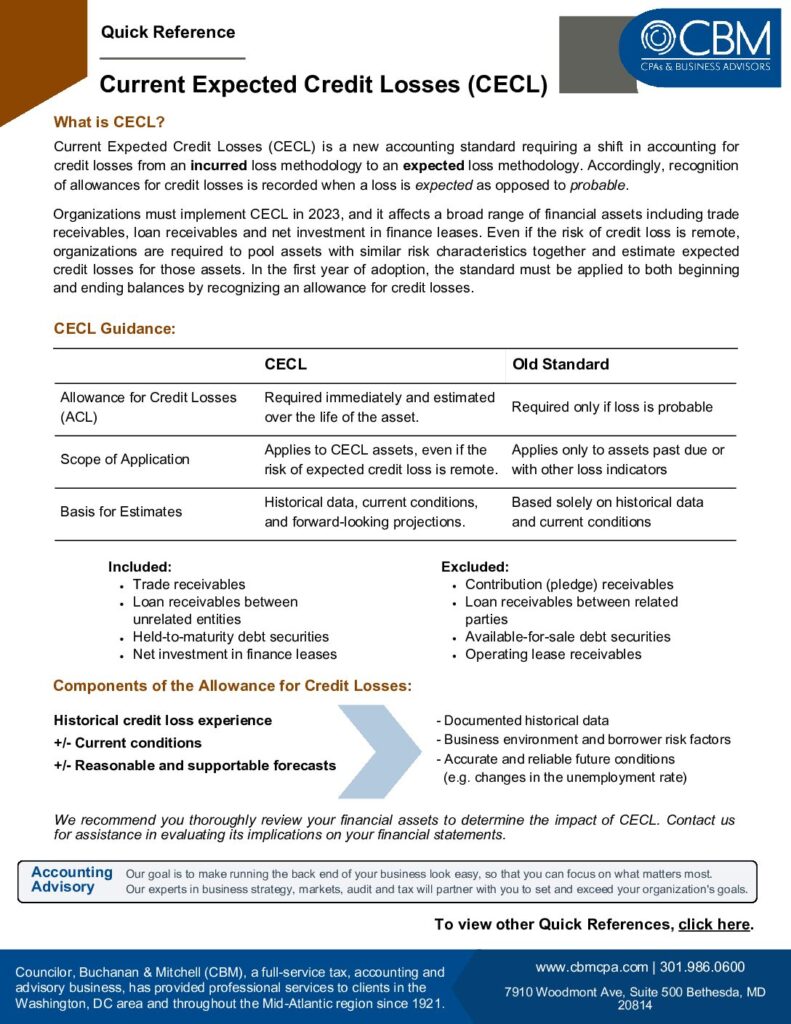
Quick References are high-level insights about critical issues and concerns facing your organization. Our outsourced accounting and advisory group is available to help you implement solutions. Click here to view other Quick References and to sign up for email alerts when future Quick References are released.
What is CECL?
Current Expected Credit Losses (CECL) is a new accounting standard requiring a shift in accounting for credit losses from an incurred loss methodology to an expected loss methodology. Accordingly, recognition of allowances for credit losses is recorded when a loss is expected as opposed to probable.
Organizations must implement CECL in 2023, and it affects a broad range of financial assets including trade receivables, loan receivables and net investment in finance leases. Even if the risk of credit loss is remote, organizations are required to pool assets with similar risk characteristics together and estimate expected credit losses for those assets. In the first year of adoption, the standard must be applied to both beginning and ending balances by recognizing an allowance for credit losses.
CECL Guidance?
| CECL | Old Standard | |
| Allowance for Credit Losses (ACL) | Required immediately and estimated over the life of the asset | Required only if loss is probable |
| Scope of Application | Applies to CECL assets, even if the risk of expected credit loss is remote | Applies only to assets past due or with other loss indicators |
| Basis for Estimates | Historical data, current conditions, and forward-looking projections | Based solely on historical data and current conditions |
Included
- Trade receivables
- Loan receivables between unrelated entities
- Held-to-maturity debt securities
- Net investment in finance leases
Excluded
- Contribution (pledge) receivables
- Loan receivables between related parties
- Available-for-sale debt securities
- Operating lease receivables
Components of the Allowance for Credit Losses:
Historical credit loss experience
+/- Current conditions
+/- Reasonable and supportable forecasts
- Documented historical data
- Business environment and borrower risk factors
- Accurate and reliable future conditions (e.g. changes in the unemployment rate)
We recommend you thoroughly review your financial assets to determine the impact of CECL. Contact us for assistance in evaluating its implications on your financial statements.
CBM’s outsourced accounting and advisory group: Our goal is to make running the back end of your business look easy, so that you can focus on what matters most. Our experts in business strategy, markets, audit and tax will partner with you to set and exceed your organization’s goals.
Save a PDF copy of the Quick Reference.
Click here to access and save a PDF copy of this Quick Reference.
Please contact Dominick V. Bellia via our online contact form for more information.
Councilor, Buchanan & Mitchell (CBM) is a professional services firm delivering tax, accounting and business advisory expertise throughout the Mid-Atlantic region from offices in Bethesda, MD and Washington, DC.



